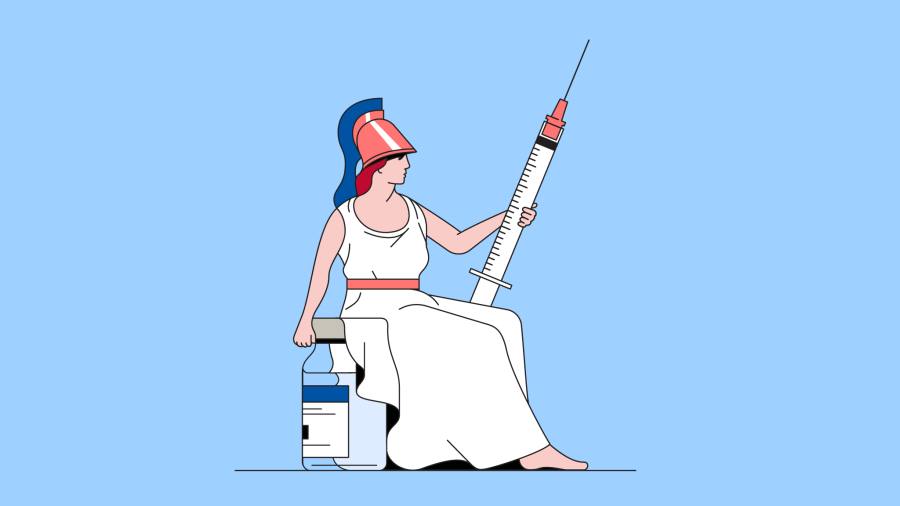[ad_1]
People like me — Remainers, as we used to be called — have spent five years banging on about the UK’s weaknesses. And there has been much to bang on about, from Brexit through hard Brexit to an exceptionally disastrous death toll from the coronavirus. The government has repeatedly killed people by closing down late or opening up prematurely, while the economy collapsed regardless.
Now, though, we need to acknowledge a British triumph: the fastest vaccine rollout of any large country. The UK has administered nearly 24 doses per 100 people, compared with about five for the EU. As long as vaccines work against new mutations, Britons will get their lives back several months before Europeans. And the UK achieved this by going solo: buying and approving vaccines before any other country. To quote that patriotic British writer Rudyard Kipling: “He travels the fastest who travels alone.†In short: what national strengths does Britain’s vaccine success reveal? Is there a model here for Brexit Britain?
The one thing the UK did right early in the pandemic was to bet on vaccination. Kate Bingham, who chaired the Vaccine Taskforce, has said: “We actually started scaling up the manufacturing of the Oxford vaccine from February [2020].†From May through July, the UK ordered hundreds of millions of jabs from different vaccine-makers.
This was a risk. There might never have been a working vaccine for Covid-19. Yet, even without hindsight, it was an economic risk worth taking, given the cost of lockdowns. The UK has spent £280bn on all aspects of fighting the virus. By comparison, £12bn for buying, making and rolling out vaccines is peanuts. The bet would have been correct even had vaccines failed.
The UK was able to make that bet, says Jonathan Portes, a professor of economics and public policy at King’s College London, largely because its political system features a strong executive. Once Prime Minister Boris Johnson gave his approval, vaccine-buying could start. A strong executive that controls parliament has its downsides: David Cameron absent-mindedly called a Brexit referendum, and Johnson blithely chose an uncosted hard Brexit. But it can also pay off in emergencies, as Gordon Brown showed in the financial crisis.
Then there’s Britain’s international pro-business instinct — which manifests more benignly when dealing with vaccines than with post-Soviet oligarchs. The UK has happily been buying vaccines from foreign groups. It has also helped these companies start producing at British sites and created the NHS Registry, a world first, where nearly 400,000 people volunteered for vaccine trials. Suddenly, the UK has a burgeoning vaccine industry. Helping winners in emerging sectors: here’s an industrial strategy for Brexit Britain.
The NHS Registry illustrates another British strength: public trust in healthcare. The National Health Service is, famously, “the closest thing the English people have to a religionâ€. If the NHS was vaccinating, the public was on board.
That freed Britain’s Medicines and Healthcare products Regulatory Agency (MHRA) from worrying much about anti-vaxxers. The agency also had the knowhow to move fast, thanks to Britain’s world-class universities and the London knowledge economy. In December, the MHRA became the world’s first regulator to approve the BioNTech/Pfizer and Oxford/AstraZeneca vaccines. Regulators elsewhere later endorsed these decisions, just as the World Health Organization eventually backed the MHRA’s approval of the Oxford/AstraZeneca vaccine for over-65s.
Portes suggests that other British regulators, in sectors such as fintech, might prove equally nimble. The MHRA is certainly nimbler than the European Medicines Agency, which “has to align independent views from 27 separate member statesâ€, Penny Ward of the Faculty of Pharmaceutical Medicine has noted.
Then the NHS unrolled vaccines rapidly. It’s a centralised organisation, used to vaccinating millions of people. It’s also Britain’s strongest legacy of the social democratic 1945-79 era, present in almost every parish and catering to almost the whole population. Whereas the ruling class traditionally opts out of state schools, it uses the NHS and so it values the service. Johnson went to Eton, but he was treated for Covid-19 in an NHS hospital.
The vaccine success helps explain why Britain left the EU while Europe’s other Eurosceptic countries stayed in. Much of the time, the UK is big enough to travel alone. Smaller states such as Portugal or Slovakia cannot easily buy and approve vaccines on their own. They had to go through the much slower European Commission.
Yet none of this justifies Brexit, an issue that has divided the country. Leaving Europe’s single market is an act of self-harm. (Trade, for all that Brexiters went on about it, is the worst possible argument for Brexit.) The silly and cruel Brexiter fantasy of the EU breaking up would have devastated many member states, especially if a collapsing euro had set off another financial crisis. And the vaccines story illustrates how lightly the EU constrained the UK: the country was free to approve medicines solo in emergencies even as a member state, and probably would have done, given its regulatory excellence.
The moral is that Britain’s ideal position would be inside the single market, but free to travel alone across most other terrains. Of course, that was exactly its position before the referendum.
Follow Simon on Twitter @KuperSimon and email him at simon.kuper@ft.com
Follow @FTMag on Twitter to find out about our latest stories first. Listen to our podcast, Culture Call, where FT editors and special guests discuss life and art in the time of coronavirus. Subscribe on Apple, Spotify or wherever you listen
[ad_2]
Source link





